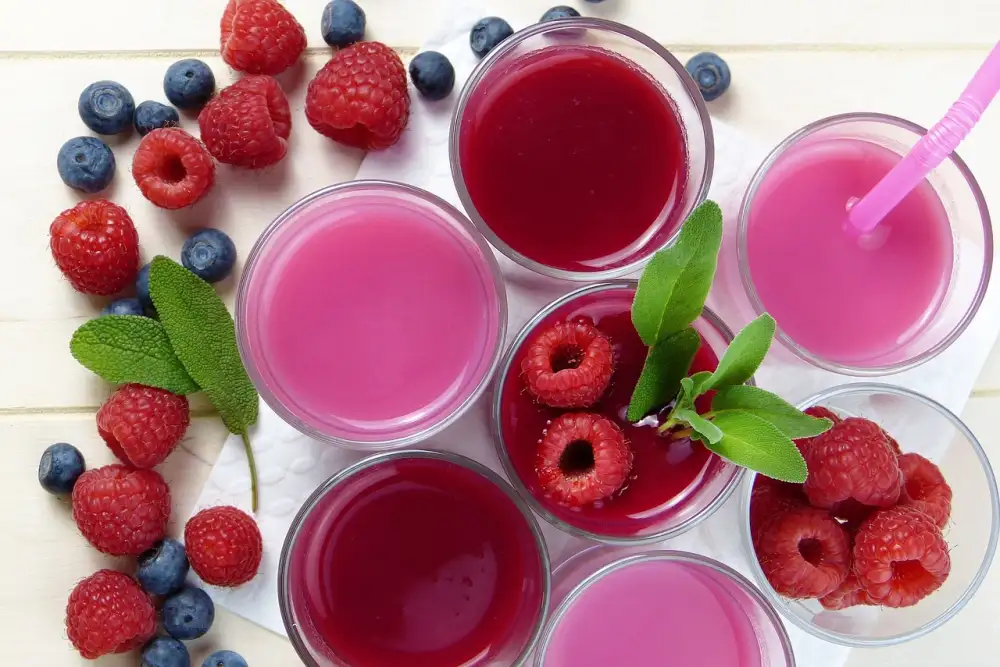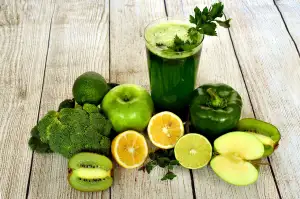Revitalize Your Health with a Juice Diet: Discover the Benefits of Juicing for a Healthier You

In today's fast-paced world, maintaining a healthy lifestyle can be challenging. However, one popular trend that has gained traction in recent years is the juice diet. This diet involves consuming fresh fruit and vegetable juices as a means of detoxifying the body and promoting overall health and wellness. The juice diet is not just a passing fad; it is a nutrient-packed path to achieving optimal health. In this article, we will explore the benefits of a juice diet, discuss the different types of juices you can incorporate into your diet, provide tips on how to start a juice diet, highlight precautions to take, answer frequently asked questions, and help you determine if the juice diet is right for you. So let's dive in and discover the wonders of the juice diet!
Benefits of the Juice Diet
The Juice Diet offers numerous benefits for those looking to revitalize their health. Firstly, it provides a convenient and efficient way to consume a wide variety of fruits and vegetables, ensuring that you receive an abundance of essential vitamins, minerals, and antioxidants. These nutrients can boost your immune system, improve digestion, and promote healthy skin.
Additionally, the Juice Diet can aid in weight loss as it is low in calories while still providing essential nutrients. By replacing high-calorie meals with nutrient-rich juices, you can reduce your overall calorie intake and shed excess pounds.
Furthermore, juicing allows for easier absorption of nutrients as the juicer extracts the fiber from fruits and vegetables. This means that your body can quickly absorb the vitamins and minerals without expending much energy on digestion.
Moreover, the Juice Diet can provide a natural energy boost due to its high concentration of vitamins and minerals. By nourishing your body with these essential nutrients, you may experience increased stamina and vitality throughout the day.
Lastly, many individuals report improved mental clarity and focus when following a Juice Diet. The abundance of nutrients supports brain function, helping to enhance cognitive performance and overall mental well-being.
Overall, the Juice Diet offers a range of benefits including improved nutrition intake, weight loss support, increased energy levels, enhanced mental clarity, and more. Incorporating this diet into your lifestyle could lead to a healthier you.
How the Juice Diet Works
The juice diet, also known as juicing, is a popular method of detoxifying and rejuvenating the body. It involves consuming only fresh fruit and vegetable juices for a certain period of time, usually ranging from a few days to several weeks.
The idea behind the juice diet is that by eliminating solid foods and consuming only liquids, the body can cleanse itself of toxins and promote overall health. The juices are rich in vitamins, minerals, and antioxidants, which are easily absorbed by the body without putting stress on the digestive system.
During the juice diet, it is important to consume a variety of juices to ensure that you are getting all the necessary nutrients. This can include a combination of fruits like apples, oranges, and berries, as well as vegetables such as kale, spinach, and carrots.
To make the most out of your juice diet experience, it is recommended to drink at least 4-6 servings of juice per day. These juices should be freshly made using a juicer or blender to retain maximum nutrients.
It's important to note that while on the juice diet, you may experience some side effects such as headaches or fatigue. This is normal as your body adjusts to the new way of eating. It is also essential to stay hydrated by drinking plenty of water throughout the day.
In addition to providing essential nutrients, the juice diet can also aid in weight loss due to its low-calorie content. However, it is crucial not to rely solely on juicing for long-term weight management. Once you complete your juice diet period, it's important to transition back into a balanced and healthy eating plan.
Overall, the juice diet can be an effective way to revitalize your health and give your body a much-needed break from processed foods. However, it's always best to consult with a healthcare professional before starting any new dietary regimen to ensure it aligns with your specific needs and goals.
Types of Juices to Include in the Diet
When it comes to the juice diet, there are endless possibilities for the types of juices you can include in your daily routine. Here are some popular options to consider:
1. Green Juice: Packed with leafy greens like spinach, kale, and cucumber, green juices are rich in vitamins, minerals, and antioxidants. They help boost immunity and promote detoxification.
2. Citrus Juice: Oranges, lemons, grapefruits - citrus fruits are high in vitamin C and provide a refreshing burst of flavor. They aid digestion and support healthy skin.
3. Beetroot Juice: Beets are known for their detoxifying properties and ability to improve blood circulation. Their vibrant color adds a beautiful hue to your juice.
4. Carrot Juice: Carrots are loaded with beta-carotene, which is converted into vitamin A by the body. This juice promotes healthy eyesight and glowing skin.
5. Berry Juice: Blueberries, strawberries, raspberries - these antioxidant-rich fruits add sweetness to your juice while providing numerous health benefits like improved brain function and heart health.
6. Watermelon Juice: Perfect for hot summer days, watermelon juice is hydrating and helps reduce inflammation due to its high water content and lycopene content.
Remember to experiment with different combinations of fruits and vegetables to find what suits your taste buds best. Enjoy the vibrant colors and flavors that nature has to offer!
Tips for a Successful Juice Diet
1. Start slowly: Ease into the juice diet by gradually replacing one meal with a juice and gradually increase the number of meals replaced over time.
2. Choose organic produce: Opt for organic fruits and vegetables to minimize exposure to pesticides and maximize nutrient content.
3. Variety is key: Experiment with different fruits, vegetables, and herbs to ensure a wide range of nutrients in your juices.
4. Stay hydrated: In addition to consuming juices, drink plenty of water throughout the day to stay properly hydrated.
5. Listen to your body: Pay attention to how your body responds to the juice diet. If you feel weak or lightheaded, consider adding a small snack or consulting a healthcare professional.
6. Incorporate fiber: Include some fiber-rich ingredients like chia seeds or flaxseeds in your juices to help maintain bowel regularity.
7. Practice portion control: While juices are packed with nutrients, they can still be high in calories if consumed excessively. Be mindful of portion sizes.
8. Don't skip protein: Ensure you're getting enough protein during the juice diet by adding plant-based protein powders or incorporating nut milks into your juices.
Remember, it's always best to consult with a healthcare professional before starting any new diet plan, especially if you have any underlying health conditions or concerns.
Potential Risks and Considerations
While the juice diet can offer numerous health benefits, it is important to be aware of potential risks and considerations before embarking on this journey.
1. Nutrient Deficiencies: Juicing eliminates the fiber content from fruits and vegetables, which can lead to a decrease in certain essential nutrients like fiber and protein. It is crucial to ensure that you are still getting a balanced diet with adequate amounts of these nutrients.
2. Blood Sugar Spikes: Some juices, especially those made primarily from fruits, can cause a rapid increase in blood sugar levels due to their high sugar content. This can be problematic for individuals with diabetes or those who struggle with blood sugar regulation.
3. Lack of Satiety: Juices may not provide the same level of satiety as whole foods, which could lead to increased hunger and potentially overeating. It is important to listen to your body's cues and supplement your juice diet with other healthy snacks or meals as needed.
4. Potential for Weight Gain: While many people turn to juice diets for weight loss, it is possible to gain weight if excessive amounts of high-calorie fruits or sweetened juices are consumed without considering overall calorie intake.
5. Interactions with Medications: Some fruits and vegetables used in juicing may interact with certain medications, affecting their effectiveness or causing adverse reactions. It is advisable to consult with a healthcare professional before starting a juice diet if you are taking any medications.
6. Sustainability: The juice diet may be challenging to sustain long-term due to its restrictive nature. It is important to have a plan in place for transitioning back into a balanced eating pattern after completing the juice diet.
Before starting any new dietary regimen, it is always recommended to consult with a healthcare professional or registered dietitian who can assess your individual needs and provide personalized guidance based on your specific health goals and medical history.
The juice diet can be a great way to kickstart your journey towards health and wellness. It offers numerous benefits, including weight loss, increased energy levels, and improved digestion. However, it is important to consider whether this diet is right for you.
If you enjoy consuming fruits and vegetables in liquid form and have no underlying health conditions that may be affected by a low-calorie diet, then the juice diet may be a good fit for you. Additionally, if you are looking for a short-term cleanse or detox, the juice diet can be an effective option.
However, it is crucial to consult with a healthcare professional before starting any new diet plan. They can assess your individual needs and help determine if the juice diet is suitable for you. Remember that while the juice diet can provide many benefits, it may not be sustainable as a long-term lifestyle choice.
Ultimately, the decision to embark on a juice diet should be based on your personal goals and preferences. If you are willing to commit to the necessary preparation and planning involved in juicing, as well as understand the potential risks and precautions associated with this diet, then it could be worth trying.
Remember that balance is key when it comes to any dietary approach. Incorporating fresh juices into your daily routine alongside a well-rounded eating plan can provide optimal nutrition and support overall health and wellness.
Published: 19. 01. 2024
Category: Health



